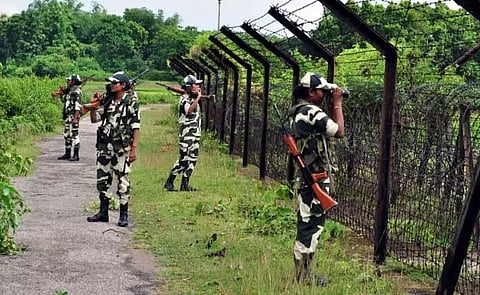
- Home
- Live Blog
- Breaking News
- Top Headlines
- Cities
- NE News
- Sentinel Media
- Sports
- Education
- Jobs

The process of detection and deportation of illegal Bangladeshi migrants in Assam has been reduced to a meaningless exercise as can be seen from information furnished by the Central Government on the floor of the Rajya Sabha. Apart from the colossal waste of taxpayers' money, the failure of the government to deport the illegal migrants has further pushed the Assamese people to the brink of losing their linguistic and cultural identities due to the burgeoning population of illegal Bangladeshis in Assam. It is a matter of grave concern that only 329 of the 1.43 lakh people declared foreigners by Foreigners' Tribunals (FT) in the state were deported to Bangladesh while illegal migration to Assam through the porous India-Bangladesh border continues unabated. The irreversible demographic change caused by the unabated migration of Bangladeshis has also reduced the political power of Assamese people as they have been reduced to a minority in more than half of the assembly constituencies. The Central Government has released Rs 69 crore over the last three years to 100 FTs for disposal of pending and new cases. Those declared foreigners by the tribunals are required to be kept in detention camps till their deportation or expulsion. Information furnished by the Central Government in the Parliament is silent about the whereabouts of these 1.43 lakh foreigners. A Supreme Court directive requires those lodged in detention camps to be released with some conditions after three years. Therefore, the failure of the government to deport all post-1971 illegal migrants immediately to Bangladesh after FTs declare them to be foreigners opens the window for them to come out of detention and roam around freely. The absence of an extradition treaty between India and Bangladesh has been a stumbling block to the deportation of identified illegal Bangladeshi migrants but the Government of India not taking up the issue with the neighbouring country is beyond comprehension. Ironically, more than 36 years have elapsed since the signing of the Assam Accord which gave a commitment by the Government of India to the people of Assam to detect and deport all post-1971 illegal Bangladeshi migrants from the state. While 855 Assamese people became martyrs and thousands injured during the vigorous six-year-long anti-foreigner's Assam Agitation, the accord has remained hostage to politics over migration and citizenship and the genuine fear of Assamese people being overwhelmed by Bangladeshis remained unaddressed all these years despite the discernible and aggravating demographic change. The process of the updating 1951 National Register of Citizens (NRC) provided a glimmer of hope of detection of all illegal Bangladeshi migrants but the process of getting stuck in legal complexities has shattered the hopes of Assamese people for a permanent solution to the vexed foreigners' issue. Over Rs, 1,600 crores spent in the Supreme Court-mandated NRC exercise has turned out to be a mere political weapon for parties and organizations as no one seems least bothered about the consequences of delay in getting a correct and updated NRC on the future of Assamese people. The indifference of political parties, ruling as well as opposition, students, and youth organizations towards failure to detect and deport illegal Bangladeshis from Assam have allowed the space for use of the historic accord for mere political rhetoric. The complexities in deportation due to the absence of an extradition treaty have put the spotlight on Clause 6 of the Assam Accord for providing constitutional safeguards to Assamese people in the state. The report submitted by the High-Level Committee on Clause 6 constituted by the Central Government is pending before the government. Apart from dealing with the question of the definition of Assamese people under the accord, the report has listed a set of recommendations for constitutional, legislative and administrative safeguards to Assamese people. Instead of allowing the report to gather dust, the government initiating steps to implement the recommendations acceptable to it and holding consultations on other recommendations which it finds problematic can assure the Assamese people of protection of their linguistic and cultural identities from extinction threats. With names of illegal Bangladeshis finding their way into the electoral rolls and updated NRC, the changing demography in a large number of assembly constituencies in the state call for immediate reservation of assembly and parliamentary seats for "Assamese people" as recommended by the High-Level Committee. While the actual percentage of seats that is too reserved can be decided through discussion with stakeholders, delay in the reservation process will only allow illegal migrants to carry on with their nefarious design of changing the demography through population explosion in new constituencies to usurp political powers and hijack the process of law-making. India taking up the issue of extradition treaty to facilitate the deportation of illegal Bangladeshi migrants in Assam and other states is crucial to ensure that constitutional safeguards are not nullified by the overwhelming population of illegal migrants changing the demography and becoming the deciding factor even in reserved constituencies.